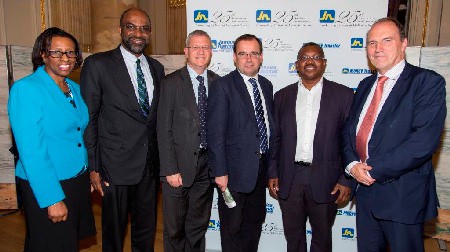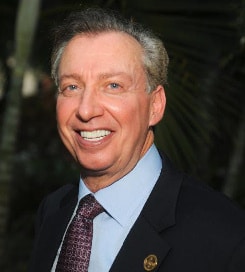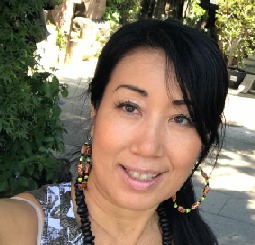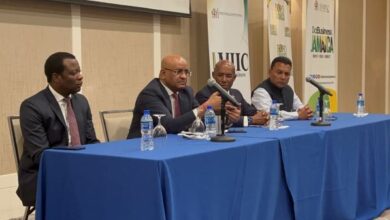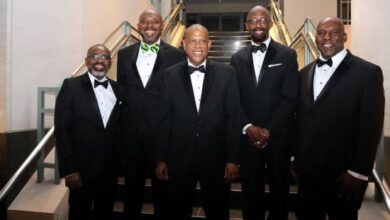Do UK Caribbean Voters have a Choice?
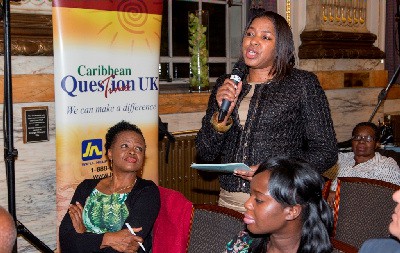
LONDON – When businesswoman Khami Alexander asked Members of Parliament from Britain’s main political parties whether Caribbean Diaspora voters were being taken for granted, she got a rousing response from the large audience attending the Caribbean Question Time 2014 forum.
The response to Ms. Alexander, came from an audience of approximately 500 mainly Caribbean origin forum attendees attuned to the changing dynamics within their community. Therefore, the question resonated when the businesswoman asked why the parties showed more interest in Asian and African Diasporas, when voters of Caribbean origin would play a decisive role in several constituencies in the elections scheduled for next year.
“Minority communities will significantly influence the outcome of the next general elections,” Ms. Alexander” reminded the representatives; and, focusing on the Caribbean Diaspora Community, she asked, “What are you going to do differently to earn our vote?”
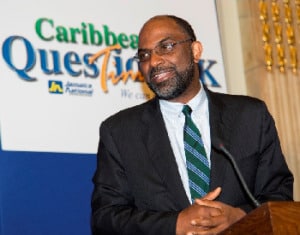
The Caribbean vote is now accessible to the Labour, Conservative and the Liberal Democratic Parties, stated Earl Jarrett, Jamaica National Building Society (JNBS), General Manager. He told the audience gathered at Westminster that the forum hosted by JNBS in London, on October 14 was an opportunity to enhance interaction with their elected and aspiring representatives.
Aimed at maintaining dialogue between Caribbean people in the Diaspora and their political representatives, the forum was the fourth held in the UK.
“The Caribbean Diaspora Community represents a significant part of the black minority ethnic voters in the UK,” Mr. Jarrett said. He noted that this was important in light of the upcoming British elections in 2015, as the 2011 Census indicates that the black and mixed race people account for approximately eight percent of the population in the United Kingdom.
Simon Hughes, Deputy Leader of the Liberal Democrats, admitted that, “The analysis that we have not addressed the Caribbean agenda and issues affecting Caribbean voters is true.”

Political parties have concentrated on communities from India, or Pakistan, or Kashmir, or Africa, Mr. Hughes said. He pointed out that Caribbean communities were generally smaller than the others, with fewer seats where Caribbean numbers are significant.
Despite that fact, he pointed out that the votes of the Caribbean community are not being taken for granted. He said, “The big issue last year was about taxes for travelling between this country and the Caribbean… I am happy to say that the government, to a large extent, made progress on that.”
Andrew Rosindell, Conservative Member of Parliament (MP) for Romford in Greater London urged the members of the large audience to, “Look at what the Conservative Party stands for, and consider whether your values in today’s world may be a bit closer (to the Conservatives) than they might have been in previous years.”
His party is now championing the value of the Commonwealth, which had previously been sidelined, Mr. Rosindell said. “I cherish the fact that there are so many countries in the Caribbean that look to Britain and want to be close to Britain.”

“However you voted in the past,” he argued, “please open your minds at the elections because the world has changed.”
Gareth Thomas, Labour and Co-operative MP for Harrow West declared that, “I represent a marginal seat; a seat that is always one of the so-called battleground seats in the general election and so I would hate to give any voter in my constituency the sense that I took their vote for granted.”
Among the issues raised by Mr. Thomas was the need to foster Caribbean talent into all political parties. He said, “We very much sought to do that in the Labour Party.”
Other issues raised by the vocal audience at the forum included the intentions of the political parties in addressing the over-representation of the black community in the criminal justice process, the issue of how black majority churches could influence political parties without becoming political tools, and the change in the historical alignment of the Caribbean Diaspora and the Labour Party.
Along with Caribbean diplomatic representatives, the Caribbean Question Time forum was attended by Lord Michael Whitby of Harborne; Shawn Clarke of the Foreign & Commonwealth Office; Dr. Joe Aldred of Churches Together in England; and Bishop Eric Brown of the New Testament Church of God.
Political representatives attending also included various London Councillors and Prospective Political Candidates Dawn Butler, Labour candidate; Bim Afolami, Conservative candidate; and Ibrahim Taguri, Liberal Democrat candidate.
